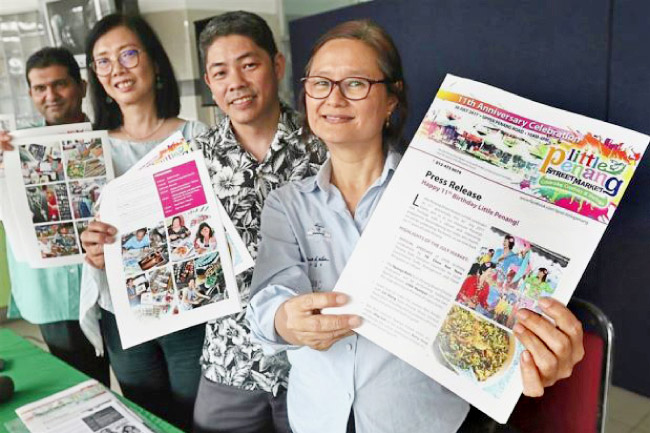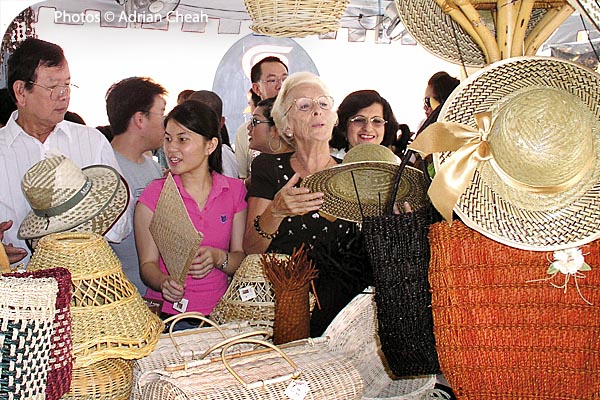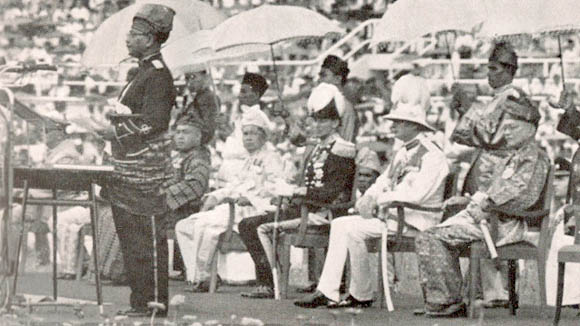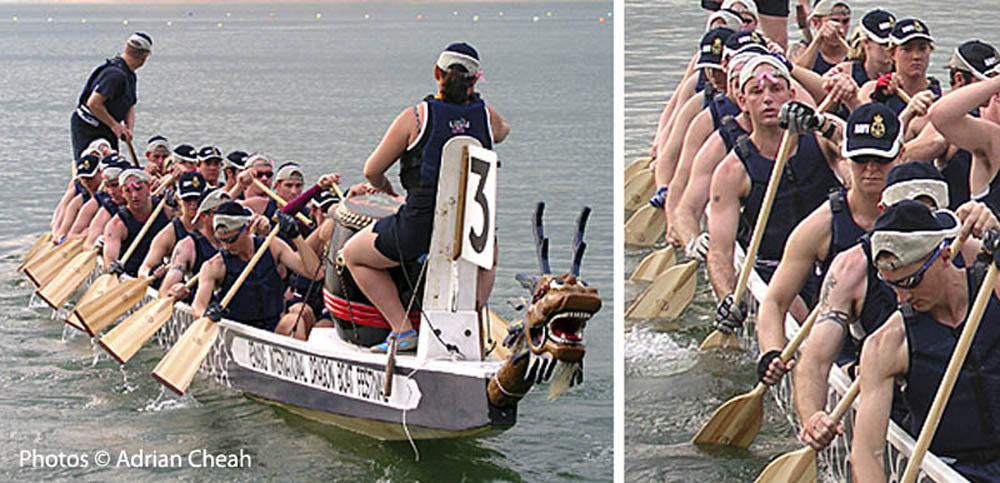Hungry Ghosts roam the Streets of George Town

The Hungry Ghost Festival, locally known as Phor Thor, is an annual month-long celebration observed by the Chinese communities not only in Penang but also throughout Malaysia, Singapore and Phuket.
Penangites are among the most hospitable people in the world – there is always an excuse for a smile, time for a welcome, and willingness to lend a helping hand. Enriched by various ethnic communities co-existing in harmony, Penang is blessed with a multi-faceted culture brought about by the integration of the many races which form its population, with each community making its unique contribution.
It has been said that the true character of a place is defined by its people. If that is true, then Penang's myriad cultural identities must be her most fascinating aspect. Despite the growing pains that accompany modern development, Penang's multi-ethnic communities have managed to preserve to a remarkable degree their traditional way of life, particularly with respect to the observance of cultural and religious festivities, among other things.
With religion being a major part of the lifestyle of Penangites, it is no small wonder that the main festivals of Penang are naturally religious in origin. Within each community, cultural identity is popularly and conspicuously asserted through religious festivals and cultural shows – Bangsawan, Boria, flag processions, the Chingay Parade, the Nine Emperor Gods Festival, the Hungry Ghosts Festival, Thaipusam and so forth. Although some of the festivals have largely departed from the versions in their source country, much of their 19th-century rituals have been retained, while developing uniquely Malaysian elements.
Penang's multi-cultural composition ensures a succession of colourful, exciting festivals and celebrations that are unrivalled anywhere else in the world. Considering the number of special events, festivals, celebrations, gods and deities' birthdays and religious occasions among the three main race groups (Malays, Chinese and Indians) when one big celebration is finished, another is just about to begin. Penangites are always game for an excuse to celebrate and feast, and there is much enthusiasm, painstaking preparation and merry-making all year round. Thus, Penang sees a kaleidoscope of festivals and celebrations which seems to last the entire year.
Many festivals take place according to the lunar calendar and, as a result, these festivals are celebrated at different times in different years, unlike the fixed dates of holidays like Christmas and Halloween for example. The lunar calendar which most of Asia uses is based on the movement of the moon, whereas the Gregorian calendar used by the rest of the world is based on the movement of the sun.
Possibly nowhere else in the world is there an open-door policy like Malaysia's for religious festivals. Friends of other faiths, whether they be from across the street or across the world, are welcomed into the homes and cultures of celebrants for a short time as their respective religious event is observed. As these festivals are religious in nature, visitors should always remember to accord them the proper respect, in terms of dressing and behaviour.
Despite the distinct ethnic and cultural differences among the various communities, Penangites have developed a sensitivity for, and an understanding of each other. Born of mutual respect for traditions, the high level of cultural and religious tolerance which abounds never fails to astound visitors. In many ways, the cultural wealth of Penang can be found in the rich festivals of its people.

The Hungry Ghost Festival, locally known as Phor Thor, is an annual month-long celebration observed by the Chinese communities not only in Penang but also throughout Malaysia, Singapore and Phuket.

Once again, Ramadhan, the holiest of months for Muslims, is almost upon us. The ninth month of the Muslim year is strictly observed by all Muslims as a month of fasting (and abstinence) during which they would abstain from the pleasures of eating, drinking and carnal desires and actions from sunrise to sunset. Ramadhan usually lasts from 29 to 30 days, after which Muslims celebrate Id-al-Fitr (Hari Raya Puasa in the local language). Fasting is one of the five basic duties of Islam.

Squatting at a corner of King Street amid the human bustle of Penang's Little India, Manickam P. sorts through a giant pile of fresh green banana leaves.
Clad in baggy khaki shorts and a sweat-soaked singlet, he seems to take no notice of either the automobiles that incessantly purr past or the hundreds of human apparitions that mill by him. The elderly odd-job worker certainly has his work cut out for him nowadays.

"The Chinese people have never demanded a clear separation of the worlds of myth and reality – indeed, they are so closely bound up that it is hard to say where one begins and the other ends." – An Introduction to Oriental Mythology, Clio Whittaker et al
"The moon, along with fine wine and beautiful women, is a favourite topic for the Chinese poets." – Chinese proverb
The Star, Friday, 4 August 2017
BY CHONG KAH YUAN
THE state government is working on a solution to keep the Little Penang Street Market going.
The market held at Upper Penang Road has just marked its 11th anniversary but its future is now uncertain after the organising committee members expressed their wish to retire.
State Local Government Committee chairman Chow Kon Yeow said he was open to new ideas on how to use the space.
The Star, Saturday, 29 July 2017
BY AFTER 11 LONG YEARS BEING A VIBRANT, INTERESTING BAZAAR, AND THE FINAL CURTAIN WILL FALL ON THE LITTLE PENANG STREET MARKET (LPSM).

(From right) LPSM committee members Khoo, Cheah, Ong and MBPP assistant administrative officer Amir Ali showing the press release on the last Little Penang Street Market and its 11th anniversary celebration.
For all the stakeholders, tomorrow will surely be a special occasion as the LPSM will also be celebrating its 11th anniversary.
“This will be the last Little Penang Street Market for us. We do not know what will happen next.

To call the Little Penang Street Market a microcosm of Penang and Malaysian cultures is no empty boast. Its multi-faceted makeup has little parallels elsewhere. But it is also an incomplete description. The Street Market isn't merely another weekend shopping spot. Penang already has plenty of those, both traditional and modern, elaborate and simple, for every day of the week. In fact, Penang is such a shopper's paradise that some have been 'moved' to say, in local language "tengok pun dah kenyang" (a Malay phrase meaning that one is sated merely by looking).

In 1956, the then Prime Minister of Malaysia Tunku Abdul Rahman Putra Al-Haj led a delegation to London to hold talks with the British Government concerning independence for Malaya.
The Malayan delegation, comprising of four representatives of the Malay Rulers and four Alliance representatives, convinced the British Government to set a date for independence: 31 August 1957.

About 100 years ago, large clans of sea-faring migrants from China settled along the foreshores of Penang island, building pier houses on the fringes of George Town.
Many of these humble coastal plank settlements, like the old Bang Liaw jetty in Weld Quay, still exist today, housing scores of fisher-folk families just as they did many decades before.
During the early period, every year on the fifth day of the fifth moon of the lunar calendar, the settlers would push out to sea lengthy specially built boats for a passionate day of racing. It was one of the great traditions they had proudly brought along from China.